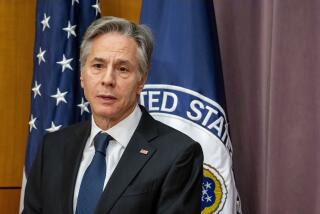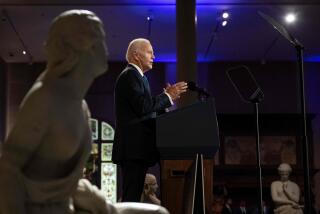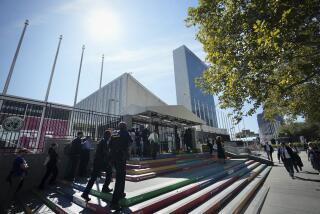THE MEDITERRANEAN SUMMIT : Bush Text: No Set Agenda for Meeting With Soviet Leader
- Share via
\o7 WASHINGTON\f7 — Here is President Bush’s Tuesday morning statement and a partial text of his news conference:
President Bush: I have a statement and then I would be glad to take a few questions.
President Gorbachev and I will meet Dec. 2 and Dec. 3 aboard U.S. and Soviet naval vessels on alternate days in the Mediterranean. Our discussions will cover the current international situation and developments in U.S.-Soviet relations.
And, in view of the full-scale U.S.-Soviet summit to be held in the United States during the late spring or early summer of 1990, President Gorbachev and I have agreed that an interim, informal meeting at this time would be appropriate.
Our talks will be informal in character, designed to allow us to become better acquainted with one another and to deepen our respective understanding of each other’s views. Neither President Gorbachev nor I anticipate that substantial decisions or agreements will emerge from this December meeting.
Question: Mr. President, what do you hope to accomplish with this? I mean, is the economy going to be one of the main parts of the agenda or do you have arms control--what do you think is really going to be the agenda. . . ?
Answer: I think there will be talk of a wide array of subjects without a specific agenda. And this is what I proposed to Mr. Gorbachev several months ago, after our return from the Paris economic summit. We’ve been working on this all that time.
Q: There’s been some speculation that a meeting of this type might be intended--an idea to revamp the Soviet economy. Are you trying to get some ideas together to go to this meeting with some type of proposal like that?
A: Well, I’m sure that now that the meeting is announced, there will be . . . many suggestions as to the subject we should discuss. . . . But there’s not going to be an agenda or meeting that could be seen to fail or succeed on whether we make agreements of this nature. That’s not what this meeting is about. . . . But there’s . . . nothing off the table, nothing on it. It’s not going to be an arms control meeting. Clearly the summit will drive the arms control agenda.
Q: How do you assess Mr. Gorbachev’s reforms? Do you think he’s in trouble?
A: I want to talk to him about their economy, our economy, a wide array of subjects. And . . . I’ve said over and over again, we want to see perestroika succeed. And they know this.
Prompt Response
Q: Now that it’s out, sir, could you tell us a little bit about the steps that led to . . . your proposal, how and when it was made, and so forth?
A: Well, I did say that I made the proposal--I believe it was in July--in writing to . . . the president, and then got a very prompt response, and then we’ve been going back and forth at that level, and then it’s been discussed by the secretary of state and Mr. Shevardnadze . . .
Q: Mr. President, since July, several of your very top officials have said publicly that they didn’t see any value in having a summit if it couldn’t be carefully prepared, absolute guarantee of success with some kind of a serious outcome. . . .
A: You know, there was one time when I felt that such a meeting wouldn’t be productive, and I think it is going to be productive, but it’s not going to be an agenda . . . meeting. We first set the summit. That will drive the arms control agenda. That’s out there with a . . . rough time frame on it. . . . I now have a much clearer view of how our allies feel on East-West relations. We’ve got problems in this hemisphere that I want to discuss . . .
Q: Mr. President, the last time there was a summit like this was in Reykjavik, and it evolved into a rather free-wheeling arms control negotiation that caused consternation in Europe, because at one point, we were talking about eliminating all nuclear weapons, which Europeans felt would give the Soviets an advantage because of their preponderance of conventional superiority. What guarantees are there that that won’t happen at this meeting?
A: Well, because . . . neither side thinks it’s going to happen, and we have a summit, an arms control summit, a summit which will be dominated by arms control issues already established . . . and the Soviet leader and I both understand the kind of meeting we want to have, so I don’t think there’s any conflict there at all.
Q: Mr. President, is one of your purposes in having this meeting to give Gorbachev a political boost at home?
A: No. . . . I hadn’t particularly thought about that. If it does, fine.
Q: Even though you say you don’t have an agenda for this meeting, can you tell us what do you think are the most pressing issues that you want to raise with Mr. Gorbachev . . . ?
A: A wide array of regional issues, of this hemisphere, Eastern Europe. Be sure I understand from him as clearly as possible his aspirations for perestroika. There’s all kinds of subjects that we’ll be discussing.
Eastern Europe
Q: Mr. President, to what extent have the events in Eastern Europe caused you perhaps to want to accelerate this? Or will that be a major factor in your discussions?
A: I expect there will be a lot of discussion of that. But, as I indicated, the genesis of this was in July when there was certainly change. We’d just come back, as you recall, from Poland and Hungary. . . . And there’s been a lot of dramatic change since then--in Germany, some moves in Czechoslovakia. So things have moved, but I can’t say that . . . the meeting was predicated on the change in Eastern Europe solely.
Q: You say this pre-summit summit is not meant to bail out Mr. Gorbachev politically. How about yourself? You’ve been criticized by the Democrats for being too timid toward Eastern Europe and toward Gorbachev, helping him with perestroika. Do you think it will help you?
A: That’s not why we’re doing it, but if that should be the fallout, so be it. We’ve known what we’re doing. We’ve been on this track for some time. I’ve elected to remain very quiet in the face of a good deal of sentiment that we were missing an opportunity. And that . . . hasn’t perturbed me because we’ve got good people that know what we’re doing in terms of the Soviet Union. And if people see that a little more clearly now, so be it; that’s a plus.
Q: It seems as though you’re going there without any initiatives. And we’re trying to read between the lines here. If that’s the case, aren’t you going to be accused once again of being timid?
A: Oh, I’m sure somebody’d politically accuse me of anything, I mean, but that’s not the point. . . . I tell you one thing, our allies will be delighted about this. They’ve just been informed this morning. And I guarantee you there will be enthusiasm through much of the free world and a lot of the rest of the world. . . . We’ve just briefed the congressional leaders and they seem to be quite enthusiastic about this. They had not known about it, and I’ve got to let them speak for themselves, but some who have not been overly supportive in the last few days seem to feel this is a very good thing to be doing.
Q: Mr. President, you said repeatedly that you’d like to see perestroika succeed. . . . What plans, if any, does the Administration have to make sure that happens, in terms of any kind of economic assistance or anything of the sort?
A: Well, we haven’t been asked for any economic assistance, and maybe this is one of the items that we will be discussing. What I want . . . to make clear to Mr. Gorbachev, and I have done that, and I don’t think there’s been a disconnect with the Soviets, is that we do want to see it succeed. . . .
Q: Let me ask--are you also concerned that reforms in the Soviet Union may be moving too quickly and it could result in a government crackdown a la China?
A: Well, some have suggested that I am--they use a different word for it, but--a little too much on the cautious side. I think there is reason to be cautious, and I’ve said that over and over again. Substitute the word prudent if you want. But I think . . . after this meeting I’ll be better able to answer your question, because I know Mr. Gorbachev to be a very frank individual, just from the contacts that I’ve had with him, which have been not as many as some, but more than most. And I think . . . that I’ll be able to give you a better answer, because . . . I don’t want to have two gigantic ships pass in the night because of failed communication.
More to Read
Sign up for Essential California
The most important California stories and recommendations in your inbox every morning.
You may occasionally receive promotional content from the Los Angeles Times.










